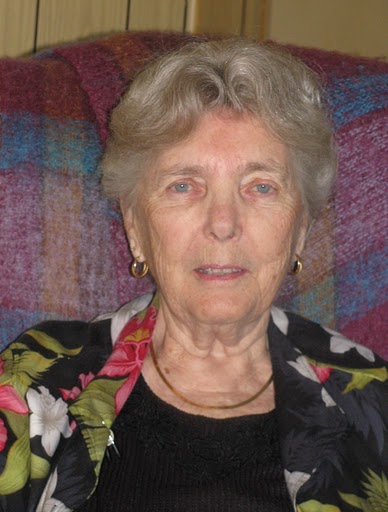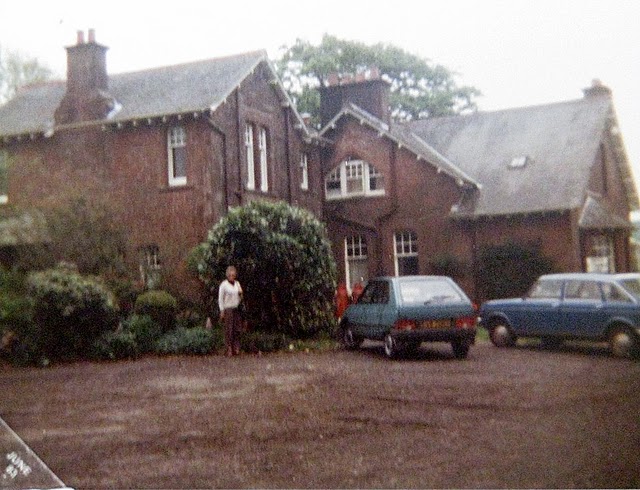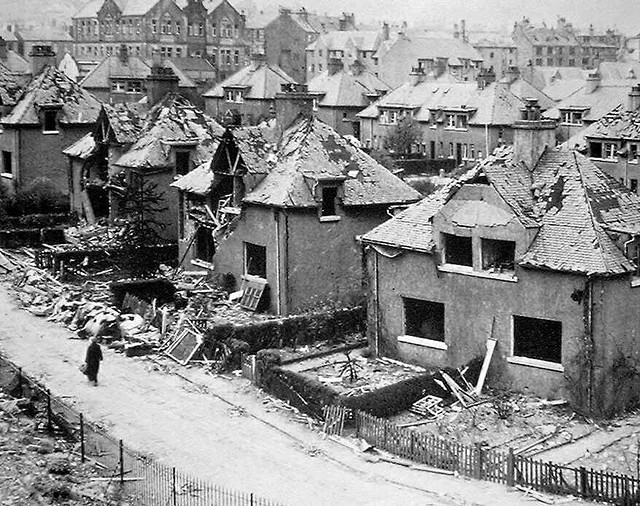Glasgow girl recalls the Luftwaffe bombing city during city during WW II

Jean Cole was 11 when Luftwaffe bombers leveled parts of Glasgow in the spring of 1941 where she grew up. Sun photo by Don Moore
Jean Cole was an 11-year-old Scottish school girl when the Germans marched into Poland in September 1939 starting World War II. She lived in a Glasgow tenement with her parents, twin sister and little brother.
“We all felt an invasion was eminent, so Britain started arming,” the 82-year-old resident of Spanish Lakes mobile home park in Nokomis, Fla. said. “Trenches were dug in the lovely park nearby and a bomb shelters made of corrugated metal with a reinforced roof was built in a hole dug in the ground out front.
“I remember King George VI coming on the radio and telling the people we were at war. Like most people in Britain we crowded around our radio to hear what he had to say. My parents were very anxious about what was going to happen, but my sister and I were excited because we weren’t sure what it all meant,” Cole recalled.
“My father joined the Home Guard, which is the equivalent of the National Guard in this country. He got a rifle with a bayonet on the end that he kept in the hallway,” she said. “He told us, ‘If any Germans come to our house we can get them with our bayonet.’ We were in awe.
“Because he was a bricklayer he was excused from regular military service.
“At public school we were all given our little gas masks and a bag of rations. We were lined up and given a tag with an evacuation number on it. Then we were sent off to the country to live. Because our little brother was a baby our mother went with us,” Cole explained.
“We wound up in a little village called Wamphray along the border with England. We assembled at the town hall and the people who signed up to take evacuees were given families to take home.
We were very lucky because a lot of families went to farms and became farm laborers. My sister and I and my little brother, together with our mother, were selected by the lady of the manor Miss Halliday to come home with her,” Cole said. “She had a chauffeur-driven car and a big house.
“That first night we ate dinner with her in a beautiful dining room. It was served by her maid. We had one wing of the house with a bedroom for my mother and little brother and a bedroom and bathroom for my sister and I.

Years later Jean stands in front of the brick manor-house she briefly stayed in with her twin sister during the early part of World War II. The home was owned by Miss Halliday. Photo provided
“We were only there a few days and my sister and i had to leave to make room for another family. We were billeted in another home about a quarter mile down the road. This was a pretty dramatic part of the war for my sister and I because we had never been separated from our family,” Cole said.
“After four months we realized this was the Phony War. The German’s weren’t going to attack us. So my mother took the three of us and returned to Glasgow.
“The ‘Phony War’ went on for two years. What saved Britain was that Hitler decided to invade Russia,” she said. “The Germans didn’t start bombing Glasgow until 1941.
Dunkirk was the real thing for the French 1st Army and the British Expeditionary Force. The German advance rolled over the British and French troops and trapped hundreds of thousands of Allied soldiers in a pocket at Dunkirk with their backs to the English Channel. During a 10 day period a flotilla of little boats from England came to the rescue of 330,000 trapped troops who were ferried back to England to fight another day.
“Even boats from Glasgow went down around England into the English Channel to rescue soldiers who were standing up to their shoulders in water,” Cole recalled. “They brought back boat load after boat load of soldiers.
“It was an incredible event. And it was the little people that made the difference,” she said.
“When the Luftwaffe showed up over Glasgow in 1941 they began with small quick raids. The siren would go off and we’d get up and get on our warm clothes,” Cole said. “We called them siren suits. They were one piece outfits with a hood we’d pull over our pajamas.
“At first went went down to the air raid shelter built out front along the street that held 14 people. It was cold, dam and dirty with very uncomfortable seats along the walls. One of these raids could last anywhere from 30 minutes to two hours.
“I clearly remember the night John Brown Shipyard was bombed. It was March 12, 1941. There were four raids that night,” she said. “That particular night the all clear was sounded and we went back to bed. Half an hour later the sires went off again and we headed for the shelter once more. On the third and fourth raids that night people didn’t leave their homes.”
John Brown Shipyard was a major target for the Luftwaffe. It’s where England built all the Queen Marys and many of their major fighting ships for the Royal Navy.
“The Germans leveled John Brown Shipyard and all of the tenements around the shipyard. There were blocks and blocks of rubble after the bombing,” she said.

Sections of Glasgow were devastated in a 2-day bombing raid March 13 - 14, 1941 by 250 enemy planes. The city lost 528 killed, 617 wounded and 48,000 residents were forced from their bombed-out homes. This is a street in downtown Glasgow. Photo provided
Some 500 people were killed and 600 were wounded during the two days the Germans bombed the shipyard. Homes for 48,000 people were destroyed in the two-day raid.
Throughout the war the only damage Cole’s tenement home sustained was shattered windows from the German bombs exploding near by.
“It was incredible what the people of Britain had to put up with from the Luftwaffe bombings. People weren’t getting any sleep. They didn’t know what was going to happen.
“My mother was a brave woman who put on a good front for us,” Cole said. “In the shelter my sister and I would sing along and play word games as the bombs fell. Some of the kids would get frightened and cry.
“This one time we went out to see my mother’s sister and were returning home at night when the sirens sounded. We could see the search lights and the anti-aircraft guns firing all around us as shrapnel fell. It was a wonder we didn’t get hit.
“This was the most frightening time during the war. We were in an area where we didn’t know where the shelters were. We were 14 or 15 and we just decided we’d walk home. It was pitch black and we couldn’t see where we were going. We were stupid young girls.

Baxter Street in Glasgow after the relentless bombing of the German Luftwaffe on March 13, 1941. Photo provided
“For us kids the game was to try and find the biggest piece of shrapnel on the ground after a raid.
“After D-Day (June 6, 1944) things began to slack off and the bombings stopped. ”
What about Winston Churchill?
“He was a dynamic speaker. He had such confidence everything was under control. He said Britain would never be enslaved. As a kid I remember being very impressed with him. When I was older and he was booted out of office I was devastated. He had been our war time leader and I thought he walked on water,” she said.
Looking back on the war years, Cole said, “My father would take off to save the world and my mother was left alone with three kids. She was so brave. I never saw her cry not once.”
“It was very exciting in Glasgow during the war years. Every nationality went into to the city,” Cole said. “We thought the Americans looked like gods from another planet. They all seemed so handsome and the few WACS (Woman’s Army Corps) I saw all looked like movie stars.
“When the war was finally over in Europe we went into Glasgow and you couldn’t move. Everybody was celebrating. It was incredible,” she said.
“After the war I finished high school. There was no work in Glasgow so I went to England to work. I always wanted to go to America because I had a long love affair with this country,” Cole said with a smile. I came here the first time in Aug. 1948 to Westfield, Mass.
“It wasn’t until 1951 that I meet Floyd.”
Her husband of 60 yeas had been a B-17 bomber pilot in the 8th Air Force flying out of a base near Norwich, England. By then he was a graduate engineer working for Monsanto, the giant chemical company.
They had five children, including one with Down’s Syndrome. It was because of Ross, her third little boy, Jean began to find out more about the problem. She eventually took college courses and while working with Boston University she became an expert on early childhood problems like his. Much of her later life was spent traveling the world educating people about what could be done for people with Down’s Syndrome.
A few years ago she and Floyd moved to Spanish Lakes mobile home park in Nokomis.
This story first appeared in print in the Charlotte Sun newspaper on Thursday, Feb. 24, 2011. It is republished with permission.
Click here to view the collections in alphabetical order in the Library of Congress. This veteran’s story will not post on this site as Don conducted this interview long before he started sending stories to the Veterans History Project.
Click here to view the War Tales fan page on FaceBook.
Click here to search Veterans Records and to obtain information on retrieving lost commendations.
All rights reserved. This copyrighted material may not be republished without permission. Links are encouraged.
Would like to talk this lady as I was born in Kilmacolm in 1941
“John Brown Shipyard was a major target for the Luftwaffe. It’s where England built all the Queen Marys and many of their major fighting ships for the Royal Navy.” Geography lesson!! John Brown ship yard was in SCOTLAND, England did NOT build all the Queen Marys and major fighting ships!! SCOTLAND did,
Remarkable how often supposedly educated writers use England and Britain as interchangeable terms. Even in the theme song to Dad’s Army for God’s sake…Inexcusable.
This photo is of Baxter Street , Greenock not Glasgow……25 miles away. Do your research please.
We interview older people whose memories are sometimes dim — here we were told Glasgow.
We appreciate your attention – yet keep in mine some of our interviews are older people with dimmed memories.
The subject of this story is actually the Clydebank Blitz of March 12-13 1941. Clydebank was, and still is, a separate town, although it does neighbour Glasgow. Glasgow was one of the few major cities in Britain not to come under sustained aerial attack during WW2. The phoney war only lasted for 8 months, until May 10th 1940, when the Germans attacked France, Belgium and The Netherlands, not 1941. Between May 1940 and March 1941, when Clydebank came under attack, the Allied forces were forced to retreat and were subsequently evacuated from Dunkirk, as you state. Western Europe was overrun and fell under Nazi control, the Blitz on London took place, the Battle of Britain also, which saw the Nazi attempt to bomb Britain into surrender blown apart by the heavily outnumbered RAF (Royal Air Force for those who did not know, which at the time was composed of pilots and air and groundcrew from not just Great Britain, but countries from all over the then British Empire, such as Canada, Australia, South Africa, Rhodesia and India and also from countries which had already been occupied, like Poland.) British forces at this time also included US citizens who had volunteered to fight against fascism, although expressly forbidden to do so as citizens of a neutral nation. I quite believe that this ladies memories are quite sharp and pertinent, the memories of this generation provide us with a valuable social history of the times and help us put a personal perspective on history. The errors contained in this article are those of basic assumption and misinformation and any one of them could have been easily rectified with the slightest research or basic knowledge of history. I am afraid that as far as the USA is concerned WW2 started on Dec 6th 1941 and that there is a general unwillingness or inability to acknowledge correctly the struggles of more than half of Europe over the previous 2 years in the fight against fascism and for survival.
Oh I would love to get in touch. My Dad who sadly died last January was evacuated to Wamphray too. He enjoyed his time there very much and worked on a farm. He was 10 years old then. He sat the 11 plus and had been accepted for the school in Lockerbie. Sadly he was unable to go there because he, too, was taken back to Glasgow and wasn’t able to go to a grammar school.